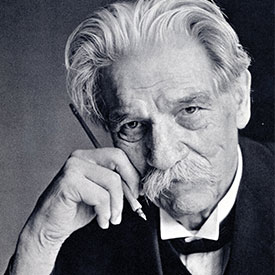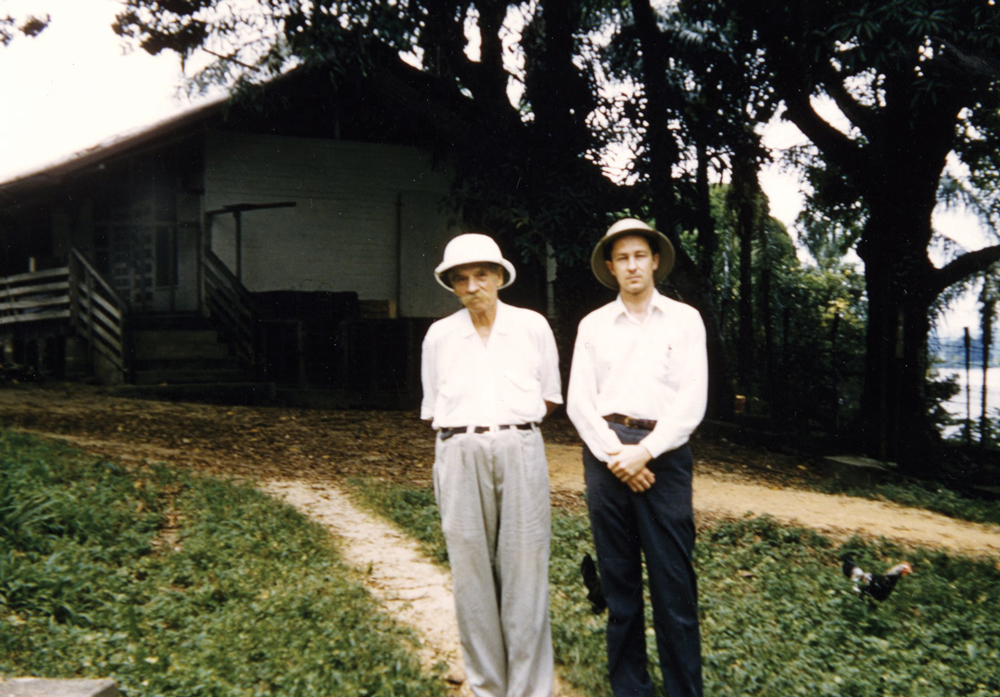 Renowned medical missionary Dr. Albert Schweitzer“I don’t know what your destiny will be, but one thing I know: the only ones among you who will be really happy are those who have sought and found how to serve."
Renowned medical missionary Dr. Albert Schweitzer“I don’t know what your destiny will be, but one thing I know: the only ones among you who will be really happy are those who have sought and found how to serve."
Those words from Dr. Albert Schweitzer perfectly sum up the powerful sense of mission at the heart of the humanitarian fellowship organization that bears his name. The Albert Schweitzer Fellowship (ASF) was founded in the U.S. in 1940 to support the hospital that the renowned physician and Nobel Peace laureate established in Gabon, Africa in 1913. In 1979, the fellowship began sending medical students to work at the hospital. Today, the ASF is dedicated to improving the health of vulnerable populations by developing a corps of “Leaders in Service”—professionals skilled in creating positive change in their local communities, within the broader health and human service systems, and throughout the world. ASF selects approximately 250 new graduate student U.S. Fellows annually, each of whom partners with a community-based organization to develop and conduct a yearlong service project that addresses unmet health needs, while simultaneously undergoing ASF’s rigorous leadership development program.
Last year, UAB announced that it would partner with the Schweitzer Fellowship to open the organization’s 13th chapter, to be headquartered at the School of Medicine. The first class of Alabama-based Schweitzer Fellows is currently being selected.
“Many of the early Schweitzer Fellows who went to Gabon came back saying that their experience played a crucial role in crystallizing their desire to serve their communities,” says Stefan Kertesz, M.D., chair of the Advisory Council for the Alabama Chapter of the Albert Schweitzer Fellowship. “Today, the program helps students tap into their potential for service without having to go all the way to Africa.”
Last summer, the School of Medicine’s Medical Education Committee voted to incorporate service learning as a standard part of the medical school curriculum. Bringing the Schweitzer Fellowship to UAB presents a powerful new service learning resource. “We very strongly want to encourage and sustain the empathy and idealism that the professional students bring with them to their postgraduate training,” says Kertesz.
 Former School of Medicine Dean Dr. James Pittman Jr. visiting Schweitzer at his hospital in Gabon in 1957The School of Medicine has a special connection to Schweitzer that dates back almost 60 years. In 1957, former School of Medicine Dean James A. Pittman Jr., M.D., traveled to visit Schweitzer at his hospital in Gabon, a trip that greatly influenced his outlook and career. After returning to the U.S., Pittman served as chief resident under Tinsley R. Harrison, M.D., and as dean of the School of Medicine from 1973 to 1992.
Former School of Medicine Dean Dr. James Pittman Jr. visiting Schweitzer at his hospital in Gabon in 1957The School of Medicine has a special connection to Schweitzer that dates back almost 60 years. In 1957, former School of Medicine Dean James A. Pittman Jr., M.D., traveled to visit Schweitzer at his hospital in Gabon, a trip that greatly influenced his outlook and career. After returning to the U.S., Pittman served as chief resident under Tinsley R. Harrison, M.D., and as dean of the School of Medicine from 1973 to 1992.
While the Schweitzer Fellowship chapter will be housed in the School of Medicine, its establishment represents a collaborative investment by the Schools of Dentistry, Public Health, Health Professions, and Nursing. The program is open to graduate students from those schools as well as from other universities around the state as well. “We want to include students from outside UAB because we feel like it will make for a more diverse group of fellows and they’ll learn from each other,” says Caroline N. Harada, M.D., assistant dean for community engaged scholarship in the School of Medicine.
That the program enhances interprofessional education is another part of its appeal, says Harada. “Learning to work in a professional team is such an important aspect of learning to be a successful physician. We wanted to foster interprofessional education opportunities, and that was a real driving force for the School of Medicine to join this program.”
Ultimately, everyone involved in the Schweitzer Fellowship hopes that it will strengthen ties to the local community and improve the health and well-being of the underserved in Birmingham and across the state. “I think that Birmingham as a whole is embracing a collaborative model and is trying to think how can we all work toward shared goals,” says Harada. “This is truly an initiative for the city of Birmingham and for central Alabama. We want it to be very inclusive.”
By Clair McLafferty